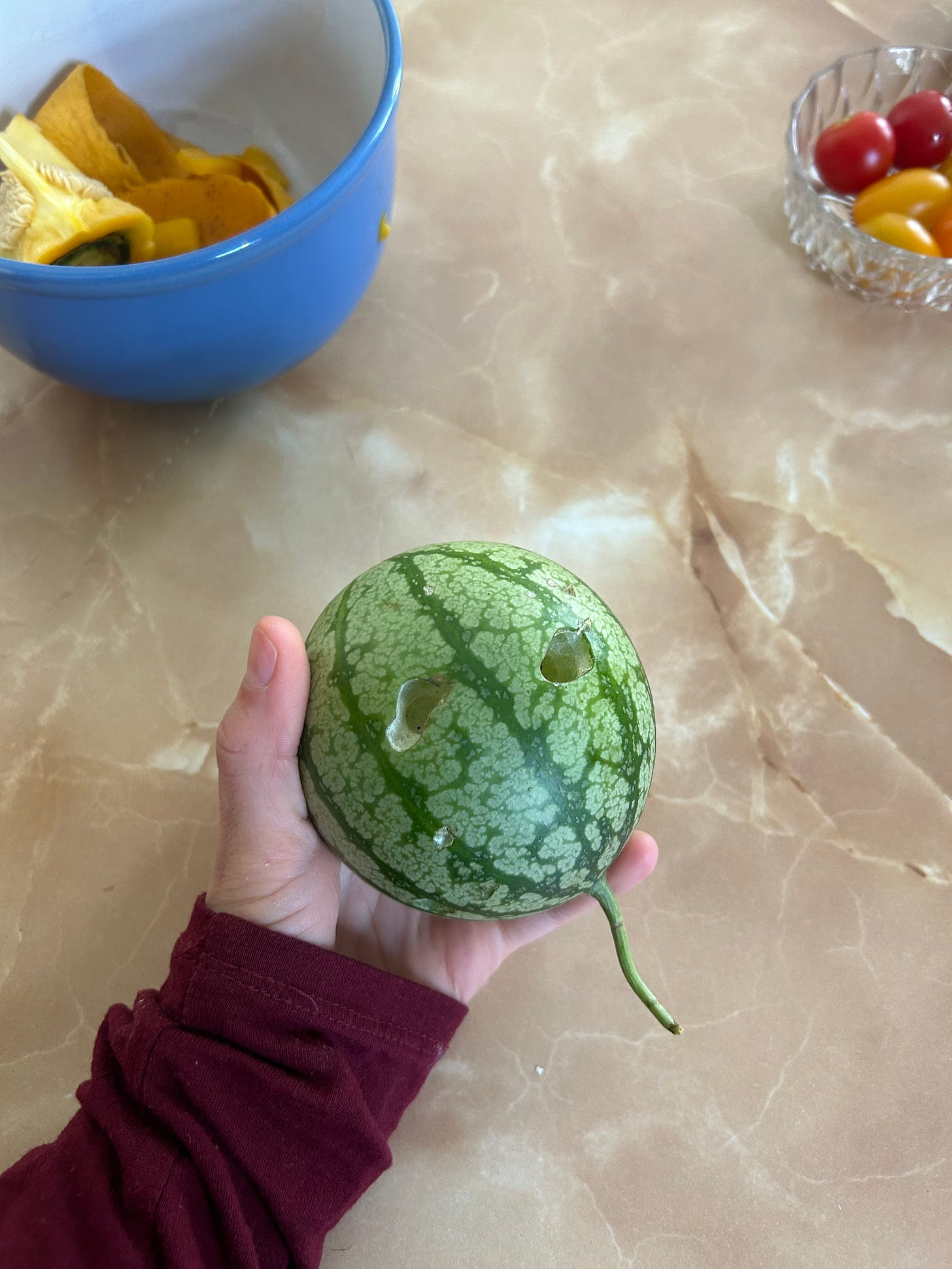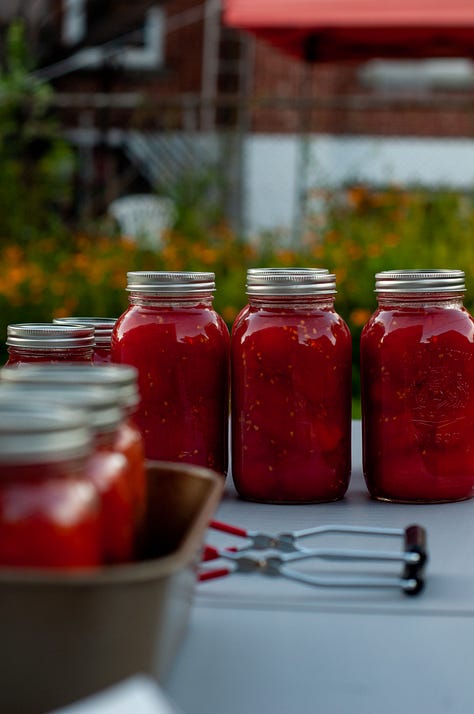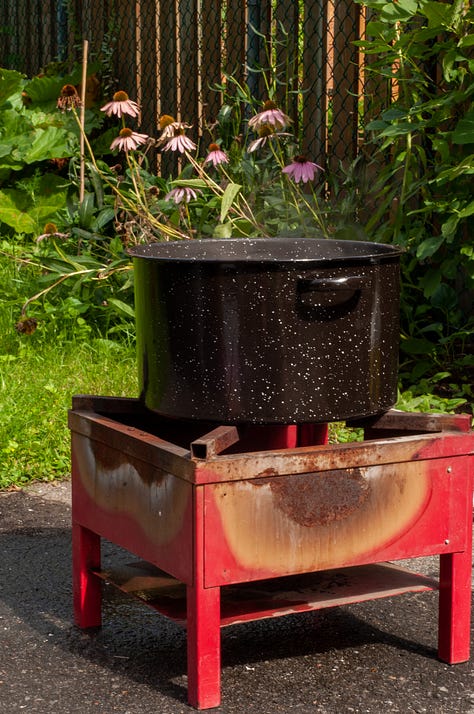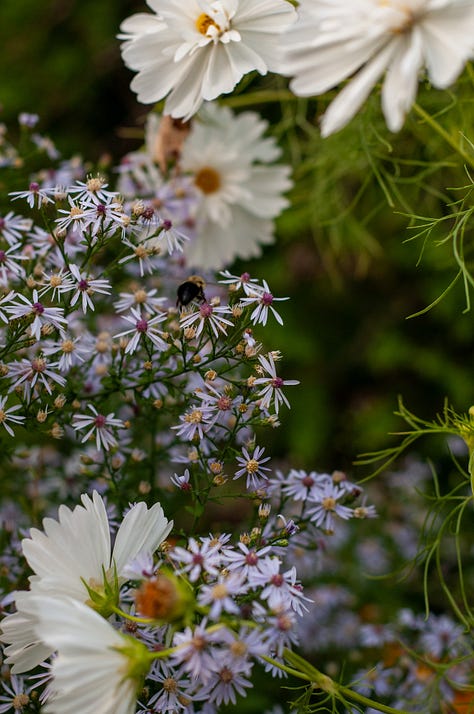Let me indulge...
On late summer beauty, ruby red tomatoes and other musings on time and life...
I’m struggling this year to wrap my head around the fact that is autumn closing in. I usually greet the coming of autumn with a great sigh of relief. After the heat, the masses of colour and the white summer light, the crispness of autumn with all of her golden song feels a bit of a refuge, a little like stepping out of an overcrowded bar into the still of night. In our bones, the music still pulses and on our lips flutters the lingering exuberance of laugh and cheer. But the night wraps us in her quiet, ushering us gently into her darkness as the lights and the music and the laughter fade into a distant echo so that we are left alone with the soft shadow of a full and vibrant hum.
It may be that this summer wasn’t quite as blisteringly hot as it can often be, mitigated by frequent showers, made full with the move into a new home, the discovery of a garden, the launch of a new project and a million different things in between. I remember very distinctly, in this season, my father telling the wide-eyed child I once was how time only seemed to go faster with every year going by.
Even then, in that time of great freedom when summers were spent running wild through the fields and winters seemingly made for digging up forts and imaginary castles in the snow, I wondered how the years could possibly go by any more speedily. Today, a part of me shudders at the impossible thought that he was right and that it could all go faster still.
“I will live to be 150” I hear myself repeating in half-breaths.
The truth, however, is that I very well may not live to be 150 or, for all I know, that I very well may do. For all the clichés that plague the notion of time and its elusiveness, there really is no way to know how much we have at our disposal, no way to control it, no way to slow it down, nor to speed it up, for that matter.
Animals live purely in the present moment - they hunt, they eat, they sleep, they mate, they love (it could be argued) and they grieve (it could also be argued). Tomorrow, for them, is much the same as today and as was yesterday. The great trouble, and therefore, I believe, the great gift of our human-ness is our ability to store complex memories and dream a thousand possible futures. We spend our entire lives stretched thin over that great void which separates yesterday from tomorrow.
Perhaps the biggest work we might be charged with in this lifetime is ability, the potential we have to infuse our human (animalistic), earthly (animalistic) existence with the spark of eternity we were gifted to carry…The plays of light on a wall. The mist rising over a field in the morning. The holding of a loved one’s hand. A piece of art, an object, moulded and shaped by another pair of human hands. A candle burning in the early night. They are all fragments we were given the great joy to recognise and create as part of that eternity.
And then, there is also bushels full of sweet, juicy tomatoes. As a kid, my mother would grow dozens upon dozens of tomato plants. For weeks on end, come the chill and the softening light of late August, the kitchen would be filled with baskets of tomatoes waiting to be turned into bright ruby sauce for our winter supply. Looking back on it all, it was probably more than she could actually handle - I remember her getting up at the crack of dawn for two or three weeks straight to tend to the burner as she canned jar upon jar upon jar. I think I didn’t quite understand then the work this entailed, nor did I quite appreciate the feeling that probably spurred her on, year after year to take on (mostly single-handedly) the immense task the harvest represented.
I do now. In a world that is in constant flux, where the unknown awaits us at every turn, where the struggle between this life, this reality and an other, more elusive sense and hunger for “eternity” seem to run constantly at odds, there is something beautiful about engaging in those seasonal rituals that anchor us in a timeless present, one that stretches out from the past and forward into the future. There is something so humbling in the act of planting a seed while the world is still grey and bare and harvest its fruit, grown large and sweet and plump a few short months later.
In July, when we moved into the new house, I planted a watermelon seed. I planted it for the sake of planting it, because more than plants themselves, I was itching to plant some seeds and impress my finger marks in the earth. I planted it not dreaming it would bear any fruit and yet, on that day we stood outside, canning those tomatoes we had got from the local farmer’s market, our neighbour cried out in surprise upon discovering a small, but very real watermelon hidden in her flower bed.

I cannot help but be humbled before such “ordinary” miracles. The earth, the seed, the plant, the fruit, becoming again the seed, the earth, the plant, the fruit… The time-bound, yet time-less cycle of life.
It seems to me we are all of that ourselves, the earth and the seed, the plant and the fruit and that we have the plan for a garden inscribed deep within us. We live in a time-bound world and therefore get to participate in that time-less dance.
This post was originally intended to be just about that mid-september day spent canning tomatoes, about keeping vigil into the night as the last cans were being processed, about the promise of bright, plush, sweet fruit for the winter month and about that immense feeling of gratitude for the rhythmic, seasonal beat of simple, earthly work.
I think I understand now why year after year my mother took on the toil of hundreds of pounds of tomatoes, because the work was also the gift, the ordinariness of it all the very thing which allowed her to root herself deep in the shadow of our collective eternity.
… Funny all you can get from a few bright ruby cans of tomatoes, huh? ;-)



With much love and until next time,
Camille



